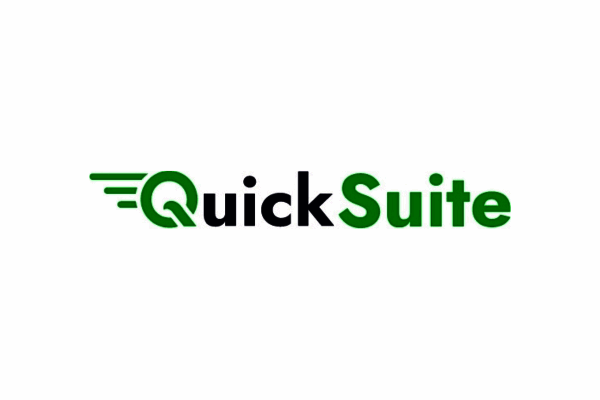Description

Appsme

QuickSuite
Comprehensive Overview: Appsme vs QuickSuite
Appsme and QuickSuite are both tools aimed at facilitating different aspects of business operations, particularly in the realm of digital solutions and app development. Here’s a comprehensive overview of these products:
Appsme
a) Primary Functions and Target Markets
- Primary Functions: Appsme is primarily a DIY mobile app development platform. It allows businesses, especially small to medium-sized enterprises (SMEs), to create customized mobile applications without requiring extensive programming knowledge. Users can design apps using a drag-and-drop interface and a variety of templates.
- Target Markets: The platform focuses on small businesses across various industries, such as hospitality, restaurants, retail, and service providers, who want to maintain direct communication with their customers through mobile applications.
b) Market Share and User Base
- Market Share and User Base: Appsme has a niche market presence that caters mainly to SMEs. Given its ease of use and affordability, it is popular among small business owners who are looking for budget-friendly options to enter the mobile app space. However, it does not wield substantial market share compared to more prominent app development platforms like Appy Pie or BuildFire.
c) Key Differentiating Factors
- Ease of Use and Cost: Appsme is known for its user-friendly interface, making it accessible for users with no technical expertise. Its competitive pricing is attractive for small business owners with limited budgets.
- Focus on Small Enterprises: It specifically caters to small enterprises, providing tools that meet their specific needs rather than trying to appeal to larger corporations or those needing complex, highly customized solutions.
QuickSuite
a) Primary Functions and Target Markets
- Primary Functions: QuickSuite is a comprehensive suite of business applications designed to assist with various operational needs such as project management, customer relationship management (CRM), human resource management, and more. It often positions itself as an all-in-one solution for business process management.
- Target Markets: QuickSuite is targeted at a broader market range including SMEs and large enterprises seeking an integrated software solution to manage diverse business functions.
b) Market Share and User Base
- Market Share and User Base: QuickSuite enjoys a larger user base and greater market penetration compared to Appsme, given its broader scope of applications. Its versatility makes it appealing to a wide range of organizational types and sizes, though it faces competition from large incumbents like Zoho and Salesforce in the comprehensive business suite market.
c) Key Differentiating Factors
- Integrated Applications: QuickSuite offers a range of integrated applications that can handle multiple facets of business operations from a single platform, providing synchronicity and reducing the need for multiple software providers.
- Scalability: Its ability to cater to both SMEs and larger enterprises through scalable solutions sets it apart. It can grow with businesses as they expand, offering additional functionalities and applications as needed.
Overall Comparison
When comparing Appsme and QuickSuite, it’s important to consider the scope and depth of each tool. Appsme is specifically designed for creating mobile apps and is most effective for small businesses seeking an easy entry point into mobile app development. Meanwhile, QuickSuite offers a more expansive software solution that appeals to a wider business audience due to its comprehensive suite of applications.
In summary, the choice between Appsme and QuickSuite largely depends on a business’s specific needs: whether they require a straightforward app development tool or an integrated suite for managing various business operations.
Contact Info

Year founded :
2005
+44020-3744-1790
Not Available
United Kingdom
Not Available

Year founded :
2020
Not Available
Not Available
Singapore
http://www.linkedin.com/company/quicksuite
Feature Similarity Breakdown: Appsme, QuickSuite
To provide a detailed feature similarity breakdown for Appsme and QuickSuite, I’ll outline their core features, compare their user interfaces, and identify any unique features that set them apart.
a) Core Features in Common
-
App Creation Tools: Both Appsme and QuickSuite offer tools for creating mobile applications without extensive coding knowledge, aimed at small businesses and individual entrepreneurs.
-
Customizable Templates: They provide a range of pre-designed templates that users can customize to fit their brand and needs, making it easier to start building apps quickly.
-
Drag-and-Drop Interface: Both platforms feature a drag-and-drop interface that allows users to add elements to their app layout easily.
-
Integration Options: Appsme and QuickSuite offer integrations with common third-party services like social media platforms and e-commerce tools (e.g., Shopify, PayPal) to enhance the functionality of the apps users create.
-
Real-time Updates: Apps created with either platform can be updated in real-time, allowing businesses to instantly update their content or services.
-
Analytics: Built-in analytics tools are available to track app performance, user engagement, and other metrics vital for app optimization.
b) Comparison of User Interfaces
-
Simplicity and Ease of Use: Both Appsme and QuickSuite emphasize user-friendly interfaces, but they might differ slightly in navigational design and aesthetics. Appsme might focus more on simplicity, catering specifically to non-technical users, while QuickSuite might offer a bit more flexibility for semi-technical users.
-
Customization Options: QuickSuite’s UI could offer more options for customization compared to Appsme, which might be a bit more rigid in terms of creative control to maintain ease of use.
-
Visual Style: Appsme may lean towards a minimalist design approach, whereas QuickSuite might feature a more robust design palette, providing advanced options for design modifications.
c) Unique Features
Appsme:
-
Focus on Small Business: Appsme is particularly tailored towards small to medium-sized enterprises, providing specific features for business activities, such as booking systems and loyalty programs.
-
Built-in Community Features: It might offer community-building tools like in-app messaging and user groups which can be beneficial for businesses wanting to build a community around their brand.
QuickSuite:
-
Support for More Platforms: QuickSuite could provide more extensive support for various platforms, possibly including web app conversions, making it a versatile choice for a broader audience.
-
Advanced API Integrations: QuickSuite might offer advanced API integration options providing flexibility for businesses that need apps to connect deeply with existing systems and workflows.
-
Team Collaboration Tools: It might include built-in collaboration features that allow multiple team members to work on app development simultaneously, facilitating teamwork.
In conclusion, while both Appsme and QuickSuite share core features that cater to ease of app creation and business needs, they target slightly different user bases and offer unique strengths that can serve different segments and requirements in the market.
Features

Not Available

Not Available
Best Fit Use Cases: Appsme, QuickSuite
To effectively outline the best fit use cases for Appsme and QuickSuite, let’s consider the key features, strengths, and target markets for each platform.
Appsme
a) For what types of businesses or projects is Appsme the best choice?
Appsme is a platform designed for creating mobile applications without extensive coding knowledge. Here's where it stands out:
-
Small and Medium-sized Enterprises (SMEs): Appsme is ideal for SMEs looking to establish a mobile presence quickly and cost-effectively. Businesses like cafes, retail stores, salons, and fitness centers benefit from its ease of use and customizable templates.
-
Local Businesses: These businesses can utilize Appsme to create loyalty programs, manage reservations, or showcase products/services to enhance customer engagement and increase retention.
-
Events and Clubs: Community organizations, clubs, and event planners can use Appsme to streamline communication, manage memberships, or promote events.
-
Niche or Limited Scope Projects: It’s excellent for businesses or projects with a specific focus or small-scale app requirements, such as a local food delivery service, boutique shops, or specialty service providers.
QuickSuite
b) In what scenarios would QuickSuite be the preferred option?
QuickSuite is typically associated with a collection of tools for business productivity and management. Here’s where it excels:
-
Enterprise-level Operations: Larger organizations will find QuickSuite an excellent choice for integrating various business processes and enhancing collaboration among teams.
-
Cross-departmental Coordination: Companies looking for seamless integration of tools for HR, accounting, CRM, project management, etc., could leverage QuickSuite for holistic management.
-
Remote and Hybrid Work Environments: Businesses that operate in remote setups can use QuickSuite to streamline processes, facilitate communication, and maintain productivity through its suite of collaboration tools.
-
Industries with Complex Processes: Sectors like manufacturing, logistics, and healthcare could benefit from QuickSuite's ability to manage and streamline multifaceted processes and data efficiently.
d) How do these products cater to different industry verticals or company sizes?
-
Industry Verticals:
-
Appsme: It is more favorable for industries that focus on direct customer engagement and service delivery, such as hospitality, retail, and local services. Its app-centric approach helps industries where customer interactions via mobile apps are crucial.
-
QuickSuite: This is tailored for industries where business process automation, comprehensive data management, and cross-functional collaboration are key. Sectors like IT, finance, manufacturing, and professional services find it beneficial for its wide range of tools that integrate seamlessly to support complex operations.
-
-
Company Sizes:
-
Appsme: Primarily targets startups, small, and medium businesses due to its simplicity, affordability, and ability to create functional apps without extensive resources or technical expertise.
-
QuickSuite: Scales across businesses from medium to large-sized companies that require integration of multiple business functions. Its suite of tools is designed to adapt to growing and complex business needs.
-
In summary, Appsme is perfect for businesses focused on mobile app engagement tailored to specific customer interactions, while QuickSuite is more suitable for businesses in need of a comprehensive suite of management tools to enhance productivity and operational efficiency across various departments.
Pricing

Pricing Not Available

Pricing Not Available
Metrics History
Metrics History
Comparing teamSize across companies
Conclusion & Final Verdict: Appsme vs QuickSuite
To provide a conclusive assessment of Appsme and QuickSuite, examining their features, usability, pricing, and overall value is essential. Here's a detailed analysis:
a) Best Overall Value
When considering which product offers the best overall value between Appsme and QuickSuite, it largely depends on the user's specific needs. However, generally speaking:
-
Appsme is often more suited for businesses looking to create mobile applications quickly and with little technical know-how. It’s a good value option for small-to-medium enterprises that prioritize ease of use and speed in application development.
-
QuickSuite, on the other hand, typically offers a broader range of features, making it better suited for larger organizations or those with more complex needs. Its value lies in providing an integrative environment that supports extensive business operations beyond app creation, such as CRM, project management, and more.
b) Pros and Cons
Appsme:
-
Pros:
- User-Friendly Interface: Simple drag-and-drop functionality is designed for users without a technical background.
- Quick Development: Allows for rapid application development, which is ideal for startups or small businesses needing a quick turnaround.
- Cost-Effective for Basic Needs: Generally more affordable, especially for users needing a simple, no-frills app.
-
Cons:
- Limited Features: May not support complex or highly customized app functionalities.
- Scalability Issues: Potential limitations in scaling the app as the business grows.
QuickSuite:
-
Pros:
- Comprehensive Features: Offers a wide range of functionalities beyond app development, such as business integration tools.
- Customization and Integration: High degree of customization and the ability to integrate with other business systems.
- Scalable Solution: Better suited for growing businesses with evolving needs.
-
Cons:
- Higher Learning Curve: More complex due to its extensive features, potentially overwhelming for users seeking simplicity.
- Cost: Typically more expensive, which might not be viable for very small businesses or limited budgets.
c) Recommendations
-
For Simplicity and Speed: If users prioritize quick and straightforward app creation without needing much customization or additional business tools, Appsme is likely the better choice. It’s particularly suitable for small businesses or individuals with limited technical expertise.
-
For Comprehensive Business Needs: If users require extensive business functionalities beyond app development, such as CRM integration or project management, and foresee growth and the need for a scalable solution, QuickSuite would be advisable. It’s more appropriate for larger enterprises or businesses with complex demands.
Ultimately, the choice between Appsme and QuickSuite should align with the user’s specific needs, budget, and long-term business strategy. Consider conducting a trial or consultation with both services to understand better which aligns most appropriately with your organizational goals.
Add to compare
Add similar companies




